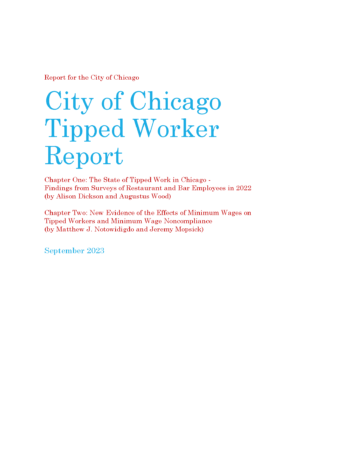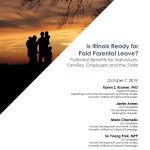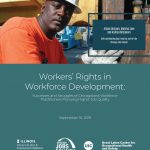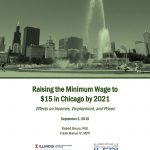
WAGE AND LABOR PRACTICES
Please find reports below that discuss policy implications for a variety of topics including minimum wage increases, “right-to-work” laws, and macro-economic impacts.
City of Chicago Tipped Worker Report
This report consists of two chapters addressing potential reforms for tipped minimum wage in the City of Chicago. The Chicago Department of Business Affairs and Consumer Protection sought the assistance of the University of Illinois and the University of Chicago in conducting a study required by the Chicago City Council that examines the economic impact of tipped wages and the effectiveness of current enforcement in Chicago.
The first chapter, by Alison Dickson and Augustus Wood, analyzes collected survey responses of tipped restaurant and bar employees working in Chicago in an effort to identify employment violations and financial hardships experienced by workers. The second chapter, by Matthew Notowidigdo and Jeremy Mopsick, focuses on recent minimum wage reforms from cities across the country with special attention on tipped workers and minimum wage noncompliance in order to draw lessons for potential minimum wage reform in Chicago.
Read full report here.
STUDY | Workers at Illinois’ Public Universities Earn Significantly Less than Peers in State Government
Workers at Illinois’ public universities are earning between 14% and 20% less than their counterparts employed directly by state government agencies, according to a first-of-its-kind study released by the Project for Middle Class Renewal (PMCR) at the University of Illinois at Urbana-Champaign and the Illinois Economic Policy Institute (ILEPI).
Read full report here.
The Impact of Service Contract Prevailing Wage Laws in the United States and Illinois | Effects on the Labor Market Outcomes of Custodial Workers
Prevailing wages establish minimum wages for different types of work on government contracts that are based on hourly wages and fringe benefits customarily paid for similar work in the local market. The main purpose of prevailing wages is to protect market standards in the competitive bidding process because public bodies are usually required to award contracts to the lowest bidder. This low-bid model of public procurement gives businesses that want to win a large government contract a financial incentive to lower their bid however possible, including through cutthroat reductions in worker wages, benefits, and training. Prevailing wage laws level the playing field, requiring all businesses competing for government contracts to reflect and maintain area standards of compensation and safety and incentivizing competition based on core competencies. Other goals are to prevent the exploitation of contract and contingent workers, ensuring that they are compensated at commensurate levels for performing the same job. Full report.
IS ILLINOIS READY FOR PAID PARENTAL LEAVE? POTENTIAL BENEFITS FOR INDIVIDUALS, FAMILIES, EMPLOYERS, AND THE STATE
Studies on paid parental leave (PPL) in Europe and, more recently, in the United States, suggest that PPL offer many benefits for children and families and even to employers. In this report we suggest that offering PPL to Illinoisans may also benefit the state of Illinois by situating it as the most family-friendly state in the Midwest. We review past research on the benefits of PPL to different stakeholders and suggest that offering PPL to Illinoisans might invigorate Illinois’ population growth by both decreasing the migration of young families out of Illinois and increasing the migration of such families to Illinois.
WORKERS’ RIGHTS IN WORKFORCE DEVELOPMENT: SUCCESSES AND STRUGGLES OF CHICAGOLAND WORKFORCE PRACTITIONERS PERSUING HIGHER JOB QUALITY
PMCR, in collaboration with Chicago Jobs Council and UIC’s Great Lakes Center for Occupational Health and Safety are excited to share findings from their survey of Chicagoland workforce providers who are actively educating their participants about their rights on the job and pursuing collaborations with high road employers. Through connecting workers’ rights education to job readiness programming, educating staff and community partners about labor laws and resources, and by using good jobs tools and metrics to rate potential employer partners, Chicago workforce development professionals are on the frontline of educating and protecting the region’s most at-risk workers.
RAISING THE MINIMUM WAGE TO $15 IN CHICAGO BY 2021
Chicago is considering increasing its minimum wage to $15 per hour by 2021, four years earlier than the rest of Illinois. Polls suggest that four-in-five Chicago residents support a $15 minimum wage. By raising the minimum wage to $15 per hour by 2021, the City of Chicago can grow the economy, reduce income inequality, reduce worker turnover, and ensure that working-class families can maintain a decent standard of living.
DO NURSE STAFFING STANDARDS WORK: EVIDENCE FROM A 2018 SURVEY OF REGISTERED NURSES
Illinois is experiencing a shortage of registered nurses caused by insufficient staffing levels that exacerbate occupational hazards and make it difficult to retain nurses. To address these issues and improve patient care, Illinois lawmakers are considering whether to follow California’s lead and adopt safe patient limits, which would establish patient-to-nurse ratios in Illinois’ hospitals. While the Nurse Staffing by Patient Acuity Amendment to the Hospital Licensing Act requires Illinois’ hospitals to create a staffing plan based on the recommendation of one or more “nursing care committees,” only 29 percent of nurses in the state say that their hospital has a staffing committee. Of those, just 44 percent say that the recommendations determined by the committee are implemented in daily staffing decisions. Current law has not been effective at addressing the shortage of registered nurses.
THE IMPACT OF ENACTING A PROGRESSIVE INCOME TAX IN ILLINOIS
Illinois has the one of the most unfair tax systems in the United States. In response, Governor J.B. Pritzker and the General Assembly have debated whether to amend the Illinois Constitution to allow the state to replace its flat-rate income tax system with a progressive (or “graduated-rate”) income tax. Illinois is currently one of only eight states that has a flat-rate tax, while 33 states have progressive income tax systems. The Project for Middle Class Renewal (PMCR) at the University of Illinois at Urbana-Champaign and the Illinois Economic Policy Institute (ILEPI) have jointly evaluated the effects of 8 different scenarios for adopting a progressive income tax in the state, including the governor’s proposed “fair tax.” The scenarios are intended to serve as examples for voters and lawmakers. A progressive income tax would transform Illinois’ tax code by bringing middle-class tax burdens down towards rates in neighboring states. Moving to a graduated-rate structure could make the state’s tax code fairer, cut income taxes for working-class and middle-class families, provide opportunities for property tax relief, help balance the budget, and provide revenue to fund essential public services that contribute to the growth of the Illinois economy.
THE REGIONAL IMPACTS OF A $15 MINIMUM WAGE IN ILLINOIS: ESTIMATES FOR SIX REGIONS
The last time that Illinois increased its minimum wage was in July 2010. A total of 13 states now have minimum wages of $10 per hour or higher, and four have enacted legislation to gradually raise the minimum wage to $15 per hour. Recent research shows that raising the minimum wage boosts worker incomes while having little to no effect on employment, business growth, and consumer prices. In this report, the Project for Middle Class Renewal (PMCR) at the University of Illinois at Urbana-Champaign and the Illinois Economic Policy Institute (ILEPI) evaluates the regional impacts of a statewide $15 minimum wage. A $15 minimum wage would directly affect more than 1.4 million adult workers in Illinois. Of these individuals, 57 percent are women, 44 percent are African American workers and Latino and Latina workers, 89 percent are U.S. citizens, and 56 percent are workers age 30 or older. A $15 minimum wage would have the largest impact on low-income workers in communities outside of the Chicago metro area. While the policy change would raise incomes by about $5,000 for directly affected workers in the Chicago area, it would increase earnings for low-wage workers by over $8,000 in the Springfield and Bloomington-Normal areas, over $7,000 in the Rockford and Champaign-Urbana regions, and more than $6,000 in the Illinois communities around St. Louis.
